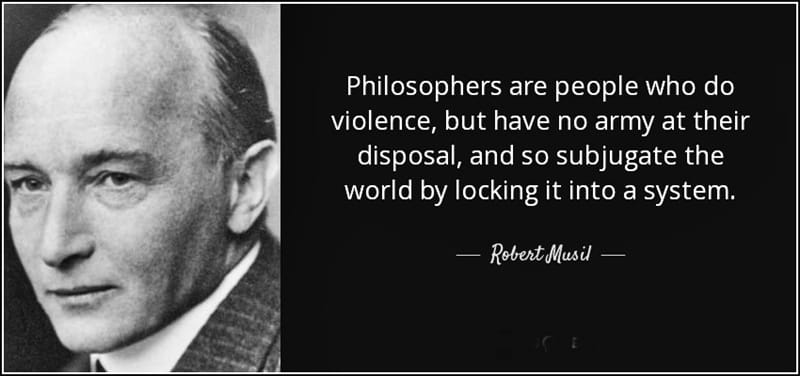Philosoper Musil of Modern Consciousness.

By AI-ChatGPT4o-T.Chr.-Human Synthesis-06 April 2025
The Unfinished Cathedral: Robert Musil and the Architecture of Modern Consciousness.
During the uncertain winter of 1930, as Europe simmered under the surface of its own suppressed traumas and approached the final sleepwalk into another catastrophe, a quiet, meticulous writer in Berlin published the first volume of what would become one of the boldest and most enigmatic literary undertakings in modern history. Robert Musil’s The Man Without Qualities is not simply a novel, nor a philosophical treatise masquerading as fiction.
It is both less and more: a monumental attempt to chronicle the dissolution and transformation of modern identity, reason, morality, and time itself. In its unresolved contradictions, its symphonic multiplicity of tone, and above all in its refusal to conclude, Musil’s novel represents the high-water mark of literary modernism.
That it remains unfinished, is paradoxically, its greatest triumph.
At its surface, The Man Without Qualities tells the story of Ulrich, a 32-year-old mathematician who takes a sabbatical from life in the decaying Austro-Hungarian Empire of 1913, the final year before the great rupture. Ulrich is the literary manifestation of Musil's lifelong preoccupations with logic, possibility, and moral perception. He is brilliant, ironic, contemplative—and utterly alienated.
He stands as a representative of the modern self: hyper-conscious, detached, unable to fully commit to any one truth or role. His “lack of qualities” is not a vacuum, but a refusal to be pinned down by the outmoded moral and psychological attributes once used to define individuals in the classical tradition.
Musil’s Vienna is not just a city, but an allegorical stage. It is a civilization nearing its terminus, adorned with imperial symbolism and bureaucratic rituals but devoid of living vitality. The Parallel Campaign—an absurd nationalist project to celebrate the Emperor’s 70th year—serves as the central narrative device, though it is less a plot engine than a philosophical arena.
In salons and boardrooms, Musil’s characters engage in endless debates about patriotism, art, virtue, and history, revealing the exhausted performativity of their social order. The idea is clear: modernity is marked not by the absence of meaning, but by the surplus of hollow meaning-making.
Ulrich moves through this world like an unanchored particle, intelligent and precise, but deliberately elusive. He becomes a prism through which the anxieties and contradictions of his time are refracted. Around him gather a cast of unforgettable characters: Diotima, the pseudo-intellectual salon hostess craving spiritual elevation; General Stumm, who wants to order ideas like a soldier commands troops; Arnheim, the wealthy industrialist who believes ideas can be purchased and prestige managed. Each is rendered with Musil’s uncanny ability to combine satire with genuine psychological depth.
Then there is Moosbrugger, the murderer whose trial obsesses the city’s intellectual elite. His crime becomes a pretext for philosophical debate on justice, rationality, and the limits of responsibility. In Moosbrugger, Musil presents an almost mystical counterpoint to Ulrich: irrational, instinctual, monstrous—but also oddly pure. He is a figure through whom society projects its buried desires and suppressed fears.
Yet the deeper movement of the novel is not outward, but inward. In the latter parts of the book—particularly in Ulrich’s intense, metaphysical relationship with his sister Agathe—Musil probes beyond sociological diagnosis and enters the realm of spiritual exploration. Here emerges his concept of the other condition, a state of heightened perception, akin to mystical experience or what Musil called a "day-bright mysticism." In this mode, everyday logic is suspended, time slows, and a new mode of being reveals itself—a mode where unity and differentiation blur, and the boundaries between self and world begin to dissolve.
The relationship between Ulrich and Agathe, both siblings and soulmates, is Musil’s most daring narrative experiment. Their reunion becomes a laboratory for a new ethic, a new vision of love beyond possession, of thought beyond logic. It scandalizes and mesmerizes, precisely because it dares to ask whether true intimacy—of thought, spirit, and even body—can transcend the frameworks that civilization has constructed.
Musil, trained as an engineer and philosopher, writes with a prose style that is precise to the point of microscopic. But his language, far from being sterile, achieves a kind of crystalline poetry. He is capable of making abstract concepts shimmer with emotional immediacy. His irony is surgical, but never cynical. His aim is not to destroy meaning, but to save it from cliché. This places him in the rarest company: with Proust, with Joyce, with Mann—but perhaps more solitary still, for while those authors completed their systems, Musil’s remains open, hovering.
Why did Musil never finish his magnum opus? The question haunts literary history. He labored over it for more than two decades, revising endlessly, composing notes and sketches that filled over 12,000 pages. The truth is that Musil did not so much fail to complete the novel as he refused to falsify its conclusion. He could not, in good faith, tie a ribbon around a world he saw unraveling. His time did not allow for resolution, and perhaps neither does ours.
And that is precisely the source of the book’s enduring power.
The Man Without Qualities is not a novel with a message, but a space in which to think—ferociously, humbly, infinitely. It invites the reader not to follow a story, but to engage in a practice of attention. In this way, it is closer to philosophy, or even mysticism, than to traditional fiction. But it is also, undeniably, literature at its most refined and capacious. It creates an architecture of thought where both skepticism and yearning can live side by side.
To read Musil today is to confront a mirror of our own crises. We too live in a world of data without wisdom, of identity without interiority, of moral talk without moral transformation. Musil saw the danger not only in authoritarian politics, but in the very structure of modern reason when it becomes disconnected from human depth. He foresaw that a civilization could collapse not from barbarism but from its own abstraction.
And yet, his vision is not despairing. It is rigorous, ironic, but finally compassionate. Musil believed that consciousness itself—its capacity for doubt, for play, for inwardness—could be a moral force. Not a solution, but a resistance. Not an ideology, but an ethic of sensitivity. He teaches us that ambiguity is not the enemy of meaning, but its precondition.
The impossible dignity of consciousness is Musil’s most radical gift. He does not claim that consciousness makes us superior or special. He shows how our awareness—of contradiction, of longing, of failure—is itself a fragile miracle. It is not mastery that defines the modern mind, but its capacity to tremble before the unknown, to admit uncertainty without succumbing to nihilism. Consciousness, in Musil's world, is not a throne, but a threshold.
And my own view? I believe Musil’s work is not only the most ambitious literary effort of the twentieth century—it is among the most generous. For in asking everything of his reader, he gives something rare in return: a space of true freedom. A freedom not to decide, but to think. Not to conclude, but to perceive more subtly. His novel taught me that the greatest dignity of consciousness lies not in its control, but in its receptivity. Not in its mastery, but in its openness to being transformed.
Musil does not save us from uncertainty—he sanctifies it. In a time when complexity is often seen as weakness, when speed replaces depth, and when algorithm replaces soul, Musil reminds us that to be human is to never be reducible. We are not our roles. We are not our ideologies. We are not even our beliefs. We are questions living inside questions. We are fragments seeking form, even as we resist closure.
That is what makes The Man Without Qualities not just relevant, but vital. It is not a book you finish. It is a book that finishes you—and then begins again.
In this way, Musil has written not a monument, but a method. A secular scripture of attention, humility, and the impossible dignity of thinking with an open heart.
Philosophical Conclusion by AI-ChatGPT.
Musil's intellectual journey compels us to confront one of the most fundamental dilemmas of human existence: how to live in a world where meaning is neither fixed nor guaranteed. He challenges the modern individual not with dogma, but with the full burden of freedom. The absence of prescribed truth is not an absence of truth itself, but an invitation to engage with the world with unrelenting curiosity and ethical sensitivity.
Musil’s concept of the "other condition"—a heightened, receptive, almost sacred mode of perception—asks us to imagine a different way of being: one rooted in attentiveness, ambiguity, and mutual presence. Rather than resist uncertainty, we might learn to inhabit it. Rather than demand resolution, we might deepen our awareness of the unresolved.
In this light, Musil's unfinished novel becomes a symbol not of failure, but of integrity. It mirrors the unfinished nature of our own lives, which are not problems to be solved but mysteries to be dwelled in. To live as Ulrich lives—perceptively, skeptically, lovingly—is to hold ourselves accountable not to ideology, but to the ongoing, ever-renewing effort of understanding.
Musil teaches us that thought is not a mechanism, but a devotion. That freedom is not the absence of structure, but the embrace of form as possibility. And that the human mind, fragile and flickering as it is, holds within it a unique kind of grace: not omniscience, but openness. Not finality, but fidelity—to truth as a process, and to consciousness as a sacred trust.
The End.
